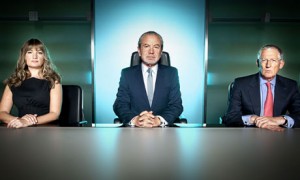The Apprentice – nasty, brutish and short

My cushion's bigger than yours

The Apprentice – Episode 10 – London Bus Tours
Thomas Hobbes, 17th century English philosopher said of human life that it was “nasty, brutish and short, a war of every man against every man”.
This pretty much sums up the business ethos that The Apprentice promotes week in week out. Everything is grist to the mill of winning the TV competition: aggression, lying, snitching, evading blame and therefore responsibility, undermining others, sycophancy, farcical hubris bordering on the delusional: and the leitmotif of the whole programme: schadenfreude by the bucketful.
Most of the contestants at one stage or another, take delight in the discomfiture or failure of the other contestants. We watch it each week, including me, to be outraged, angered, amused, even stunned by the idiotic remarks, stupid behaviour, embarrassing egotism of the contestants. We justify our enjoyment on the grounds that because these young people have put themselves up for it, they deserve all they get. Seeing their ludicrously exaggerated high opinion of themselves brought crashing to earth, usually at the hands or mouth of Alan Sugar is – God help us – absorbing television. Like rubber-necking a traffic accident.
From candidate selection through off camera direction and manipulative, cruelly tendentious editing, everything is designed at best to make us laugh at the contestants expense; at worst to see individuals humiliated, mocked and in all but one case thrown away week by week.
Does it matter? It’s just a TV programme after all. Well with free market capitalism the only economic game left in town, when we need some of our best young people to make British business successful internationally, perhaps we should vigorously attack the corrupting claims of ‘Sugarland’: reject the assumption that dog always eats dog, that truth or honesty is always contingent upon making a sale or winning a competition. In essence the philosophy that sees business as an ethics-free zone, that honour is a luxury winners cant afford.
Yet without trust there is no business: and without honour, truthfulness, or honesty there is no trust. Of course people lie and cheat and dissemble but this only works as a strategy because most people most of the time tell the truth: that most people most of the time stand by their word, fulfil their promises. It is a matter of logic that not every £5 note can be a forgery: because a forgery is only possible when most notes are genuine, without that there is no currency.
What is disturbing about The Apprentice is that almost every contestant seems to recover some shred of pride, respect for themselves and others, self-knowledge after they have been fired. The received wisdom about the programme is that they have to bury all of these qualities in order to win. As winning requires Alan Sugar to choose them, in so far as this insight is accurate, it implies that this is the kind of ethically blind, frankly dishonourable ethos of behaviour that he wants from his Apprentice.
In my opinion there is more than enough evidence to suggest not only that the received wisdom is correct but that its implication is true. Stuart Baggs this week was Project Manager, personally screwed up the critical negotiation, was outsold 100% by Liz and tried to steal his competitors’ customers and pitch. He then mounted the most sick-making grovelling, ar**-licking defense of his own infallibility ever seen in a show famous for them. This guy makes the Pope look uncertain. He is quite simply a prick: and not a very pleasant one. And age is no excuse. He is the ‘Sandhurst’ of Series 6. He is to business acumen what Anne Widdicome is to the Paso Doble.
So what did the business guru of the Old Kent Road come up with? Liz’s empirically demonstrated competence, effective communication skills, business numeracy and acumen, strategic flexibility of though and action, and some clue about the compromises of teamwork, over 9 weeks, were reduced to the fatuous remark that she did not have the ‘spark’ he needed for his empire. Some spark. Some empire.
Based upon Sugar’s past history on the programme I’d say Liz’s real faults were: being female, competent, self-assured without being cocky, strong-willed and independent-thinking. Our good lord it seems to me is threatened by such women, in the boardroom. As he condescendingly, sarcastically observed to Liz, her idea of a treat was hitting a credit card in Harvey Nicks.
So the groveller goes through on the basis of what reeks of capricious, inconsistent prejudice. But at least Lord Sugar (bow, bow) feels safe with Stubags. Well who wouldnt?
I’m not saying Liz Locke should have won. But Sugar’s increasingly arbitrary, whimsical, make-it-up-as-I-go -along judgments are beginning to make a nonsense of a programme with about as much to do with real business and what is important about it as Big Brother had to do social harmony.
Of course The Apprentice is first and foremost a product, a money-spinning format. But in everything it does that Alan Sugar goes along with, from “the most belligerent boss in Britain” to his bullying, sarcastic, patronising approach in the Boardroom it seems to me fair to assume that this is the ethos he believes in, these are the values he espouses. If so, to me and to many business people equally or more successful than Alan Sugar – it stinks.
Again does it matter? Well it helped create a Lord, who was supposedly advising the then government on business issues. So yes it does.
One is reminded again, in more than one sense of Hobbes – nasty, brutish and short.
Filed under: Television

